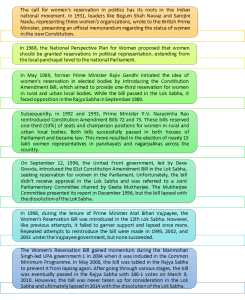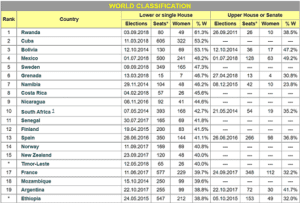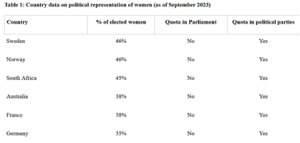THE CONTEXT: In September 2023, the Parliament passed the historic Constitution (One Hundred and sixth Amendment) Bill also known as the Nari Shakti Vandan Adhiniyam. This Bill aims to reserve 33% of seats in the Lok Sabha, State Assemblies and the National Capital Territory of Delhi for women. The following article attempts to analyse this Bill(Now Act) and its repercussions on the Indian socio-political scene from UPSC perspective.
KEY ASPECTS OF THE 106TH CAA, 2023
The Nari Shakti Vandan Adhiniyam, 2023 suggests modifying a single constitutional provision, Article 239AA, and adding three new articles: Articles 330A, 332A, and 334A.
Article 239AA (Amended)
- Article 239AA to the constitution grants special status to the Union Territory of Delhi as national capital with regards to its administrative and legislative functioning.
- Article 239AA(2)(b) was amended by the Act accordingly to add that the laws framed by parliament shall apply to the National Capital territory of Delhi.
Articles 330A
- The Act provided that reserved seats for women may be allotted by rotation to different constituencies in states or Union Territories for representation in the Lok Sabha.
- In the seats reserved for SCs/STs, the Act sought to provide one-third of the seats to be reserved for women on rotational basis.
Articles 332A
- The reservation of seats for women in every state Legislative Assembly.
- Additionally, one-third of the seats reserved for SCs and STs must be allocated for women, and one-third of the total seats filled through direct elections to the Legislative Assemblies shall also be reserved for women (Article 332).
Articles 334A
- The reservation will be effective after the census conducted after the commencement of this Act.
- Based on the census, delimitation will be undertaken to reserve seats for women.
- The reservation will be provided for a period of 15 years (Sunset Clause).
- However, it shall continue till such date as determined by a law made by Parliament.
- Provisions of this act shall not affect any representation in legislative assemblies and the Lok Sabha until their dissolution.
TRACING THE EVOLUTION OF RESERVATION FOR WOMEN IN LEGISLATURES

WHAT ARE THE ISSUES IN THE NARI SHAKTI VANDAN ADHINIYAM, 2023?
DELAYED IMPLEMENTATION AND ROTATIONAL MEMBERSHIP
- The Opposition has expressed concerns about linking the implementation of women’s reservation to the periodic delimitation exercise, which could cause significant delays in the quota’s enforcement.
- The decennial Census, originally scheduled for 2021 but delayed due to the COVID-19 pandemic, is yet to be conducted. This implies that the implementation of women’s reservation will likely be postponed for several years.
- The act provides for rotation of seats after every delimitation exercise as against after every general election to the Parliament/ State legislative assemblies.
OVERLOOKING WOMEN FROM OTHER BACKWARD CLASSES (OBCs)
- While there is reserved representation for Scheduled Castes (SCs) and Scheduled Tribes (STs) in the Lok Sabha and State Legislative Assemblies, there isn’t a distinct reservation for OBCs, who constitute over 40% of the population.
- Two Lok Sabha members, Asaduddin Owaisi and Syed Imtiyaz Jaleel of the AIMIM, opposed the Bill because they felt it should include separate quotas for OBC and Muslim women, as both communities are underrepresented in Parliament and Legislative Assemblies.
AGAINST EQUALITY
- Idea of reservation runs counter to the principle of equality enshrined in the Constitution (Article 15), as women may not be competing on merit.
- There also is a concern that women who are nominated purely because of the reservation might not be as experienced or qualified as other candidates.
INSTRUMENTALIZATION OF WOMEN
- There’s a risk of women being used as political pawns, with male relatives or party leaders pulling the strings behind the scenes.
- In such cases, women may not have genuine agency and authority in decision-making.
LESS IMPACT ON POLITICAL EMPOWERMENT OF WOMEN
- There are larger issues of electoral reforms such as criminalization of politics, internal democracy in political parties, etc., that might act as an impediment to political empowerment of women.
- Further, India has ranked 127th/146 in the recent gender inequality index. India’s neighbours Pakistan ranked at 142, Bangladesh at 59, China at 107, Nepal at 116, Sri Lanka at 115 and Bhutan at 103. This shows mere Parliamentary representation may not completely change ground realities for women.
DISPARITY ACROSS STATES
- The act provides for reservation of 1/3rd seats across all Lok Sabha seats as against provision of reserving 1/3rd seat in each State/UT as mentioned in 2008 bill.
RESERVATION IN RAJYA SABHA AND LEGISLATIVE COUNCILS
- The Act does not contain any provision for reservation for women in Rajya Sabha and Legislative Councils of the States.
- The Geeta Mukherjee Committee (1996) recommended providing reservation for women in Rajya Sabha and Legislative Councils as well.
DELIMITATION
Delimitation involves adjusting the boundaries and number of seats in legislative bodies based on the latest Census data. The last delimitation order by the Delimitation Commission was issued in 2008, defining constituency boundaries. However, there’s currently a freeze on altering the number of seats in State Assemblies and the Lok Sabha. In 2002, Article 82 was amended to postpone the necessity of reallocating Lok Sabha constituencies and State divisions until after the 2026 Census.
WHY SHOULD INDIA GIVE RESERVATION FOR WOMEN IN PARLIAMENT?
Countries like India have compelling reasons to implement reservations for women in Parliament to promote gender equality and address historical and structural disparities. Here are some key arguments in favor of providing reservations for women in parliamentary seats:
GENDER EQUALITY
- One of the primary reasons for women’s reservation in Parliament is to rectify historical gender imbalances in political representation.
- Women have been traditionally underrepresented in politics, and reservations aim to correct this inequality.
POLITICAL EMPOWERMENT
- Women’s reservation empowers women to actively participate in decision-making processes and influence public policies.
- It ensures that women’s voices and perspectives are heard and considered in political discourse.
DIVERSE PERSPECTIVES
- Greater gender diversity in Parliament results in a broader range of perspectives on issues like health, education, and social welfare. This can lead to more holistic and effective policymaking.
SOCIAL JUSTICE
- Reservations for women can help address societal injustices and promote gender equity by offering opportunities to marginalized and underprivileged women who may not otherwise have access to political power.
ROLE MODELS
- Women in leadership positions serve as role models for younger generations, encouraging girls to aspire to political careers and breaking down gender stereotypes.
LEGAL PROTECTIONS
- Women in Parliament can advocate for and enact legislation that promotes women’s rights, safety, and welfare, addressing issues like domestic violence, workplace harassment, and gender discrimination.
INTERNATIONAL COMMITMENTS
- Many countries have international obligations to promote gender equality, as per agreements like the Convention on the Elimination of All Forms of Discrimination Against Women (CEDAW). Women’s reservation policies help fulfill these obligations.
- India is a signatory to Convention on the Elimination of All Forms of Discrimination against Women (CEDAW). The treaty was signed on 30th July, 1980 and was ratified on 9th July, 1993.
WOMEN HIGHLY UNDERREPRESENTED IN THE PARLIAMENT
- While the percentage of women MPs in India has increased from 5% in the first Lok Sabha to 15% in the 17th Lok Sabha, it remains relatively low.
- While countries like Rwanda have about 60 percent women in the Parliament, the percentage of women representatives in the Indian Parliament hovers around a mere 15 percent in Lok Sabha and 14 percent in Rajya Sabha, while they constitute about half of India’s total populace.

While reservations for women in Parliament have generated debate and discussion, proponents argue that they are a necessary step to address long-standing gender disparities and ensure a more equitable and inclusive political system.
PROPONENTS AND OPPONENTS FOR RESERVATIONS FOR WOMEN IN PARLIAMENT
PROPONENTS
- Addressing Underrepresentation: Women’s reservations are seen as a necessary measure to address the historical underrepresentation of women in politics, ensuring that their voices are heard and their concerns are addressed.
- Promoting Gender Equality: Reservations promote gender equality, which is not only a fundamental human right but also essential for a just and equitable society.
- Diverse Perspectives: A more diverse representation in Parliament ensures that a broader range of perspectives is considered in policymaking, which can lead to more comprehensive and effective governance.
- Impact on Public Goods: Studies have shown that women elected under reservation policies tend to invest more in public goods closely linked to women’s concerns, such as education and healthcare.
- Eliminating Discrimination: International agreements, such as the Convention on the Elimination of All Forms of Discrimination Against Women, call for the elimination of discrimination against women in political and public life, and reservations can be a means to fulfill these obligations.
- Positive Outcomes in Local Governance: Reservation policies for women at the local level have been found to enable women to make meaningful contributions to governance, and concerns about women being proxies to men have not materialized.
- Global Perspective: Many countries have successfully implemented women’s reservation policies and quotas, reflecting a global trend in promoting gender equity in politics.
OPPONENTS
- Narrow Outlook: Some opponents argue that women’s reservations may lead to a narrow outlook as women may be seen as not competing on merit but rather through a separate constituency.
o For example, during the Constituent Assembly discussions, Renuka Ray (Member of the Lok Sabha (1957–1967)) argued against reserving seats for women, stating that women would have more opportunities if their consideration was solely based on their competence.
- Perpetuating Unequal Status: Critics argue that such reservations could perpetuate unequal status, as women might be viewed as not being able to compete in general constituencies on their merit alone.
- Issues with rotational representation: The rotation of reserved constituencies in each election could reduce the incentive of an MP to work for their constituency, as they may become ineligible to seek re-election from that same constituency.
- Larger Electoral Issues: Opponents emphasize that larger issues affecting the political system, such as criminalization of politics, internal party democracy, and financial transparency, have not been adequately addressed by these reservations.
- Not All Women Benefit: Some argue that the benefits of reservations primarily accrue to women from privileged backgrounds, leaving out marginalized and underprivileged women.
THE WAY FORWARD
AMBEDKAR’S VISION FOR INCLUSIVITY
- Dr. B.R. Ambedkar, the architect of the Indian Constitution, stressed the importance of social justice and inclusivity. In the spirit of Ambedkar’s vision, reservations for women can be seen as a means to ensure equal political participation for a historically marginalized group.
RESERVATION BASED ON INCLUSIVE OUTCOMES FOR THE SOCIETY
- A parliamentary committee in 2009 noted that reserving seats for women in local bodies has enabled them to make significant contributions and dispelled concerns about women merely being proxies for men.
- A 2010 study by the Harvard Kennedy School also showed that female representation in village councils increased female participation and responsiveness to concerns such as drinking water, infrastructure, sanitation and roads.
- Thus, reserving seats for woman in the Parliament is definitely a game changer in the process of women empowerment.
INTERNATIONAL OBLIGATIONS
- The Convention on the Elimination of All Forms of Discrimination Against Women (CEDAW), to which India is a signatory, obliges the country to eliminate gender discrimination in political life. Reservations for women align with this international commitment. Thus, the Indian government must ensure that this law fructifies efficiently at ground.
GEETA MUKHERJEE COMMITTEE RECOMMENDATIONS
- Recommendations of the Geetha Mukherjee Committee must be implemented which include reservations given in the Rajya Sabha and the state Legislative Council.
INTERNATIONAL COMPARISONS
- Comparative analysis with countries that have successfully implemented women’s reservations, like Rwanda and Nordic countries, highlights the positive outcomes in terms of gender equality and women’s welfare.
POLITICAL PARTY REFORMS
- While women’s reservations are crucial, broader electoral and political party reforms are equally important.
- Addressing issues like criminalization in politics, ensuring internal democracy within parties, and curbing the influence of black money can create a more conducive environment for women to thrive in politics.

THE CONCLUSION: The issue of women’s reservation in the Indian Parliament resonates deeply with philosophical principles of justice, equality, and democracy. In a nation that aspires to be a beacon of democratic values, this question is not merely about increasing numbers; it is a matter of upholding the very essence of democracy and social justice. The idea of equal participation in decision-making processes is a cornerstone of democracy. It aligns with John Rawls’ “difference principle,” which posits that inequalities are justifiable only if they benefit the least advantaged. Reserving seats for women recognize the historical disadvantage faced by women in politics and society at large and seeks to rectify this inequity.
QUESTIONS:
Q 1. Discuss the historical evolution of women’s reservation in the Indian Parliament. What are the key challenges and prospects associated with its implementation?
Q 2. How far do you agree with the view that the 106th CAA is a truly transformative intervention towards making the Indian political democracy engendered?
ADDITIONAL INFORMATION
Key changes between 2008 Bill and Bill introduced in 2023
| Bill introduced in 2008 as passed by Rajya Sabha | Bill introduced in 2023 | |
| Reservation in Lok Sabha | One-third of Lok Sabha seats in each state/UT to be reserved for women | One-third seats to be reserved for women |
| Rotation of Seats | Reserved seats to be rotated after every general election to Parliament/legislative assembly | Reserved seats to be rotated after every delimitation exercise |
GEETA MUKHERJEE COMMITTEE
The Geeta Mukherjee Committee, formed in 1996 to study and make recommendations on the Women’s Reservation Bill, proposed several key recommendations to address the issue of women’s reservation in Indian politics. These recommendations were aimed at ensuring greater political representation for women. Here are some of the key recommendations made by the Geeta Mukherjee Committee:
- 33% Reservation: The committee recommended the reservation of 33% of seats for women in both the Lok Sabha (the lower house of India’s Parliament) and state legislative assemblies. This reservation would have applied to both general and reserved constituencies. It also advocated reservation for women in the Rajya Sabha as well as the State Legislative Councils.
- Rotation of Reserved Seats: To ensure equitable representation, the committee suggested the rotation of reserved seats for women in successive elections. This means that different constituencies would be reserved for women in different election cycles.
- Reservation for Scheduled Castes (SC) and Scheduled Tribes (ST): The committee proposed that out of the reserved seats for women, one-third should be further reserved for women from SC and ST communities. This aimed to address the dual disadvantage faced by women from these marginalized groups.
- Reservation for Anglo-Indian Community: The committee suggested the continuation of reserved seats for the Anglo-Indian community in the Lok Sabha and state legislative assemblies. This was aimed at safeguarding the interests of this minority community.
- Two-Child Norm: The committee recommended that persons with more than two living children should be ineligible to contest the elections under the women’s reservation provision. This recommendation aimed to encourage family planning.
- Reservation for Economically Weaker Sections: The committee suggested the introduction of a sub-quota within the women’s reservation for economically weaker sections (EWS).

